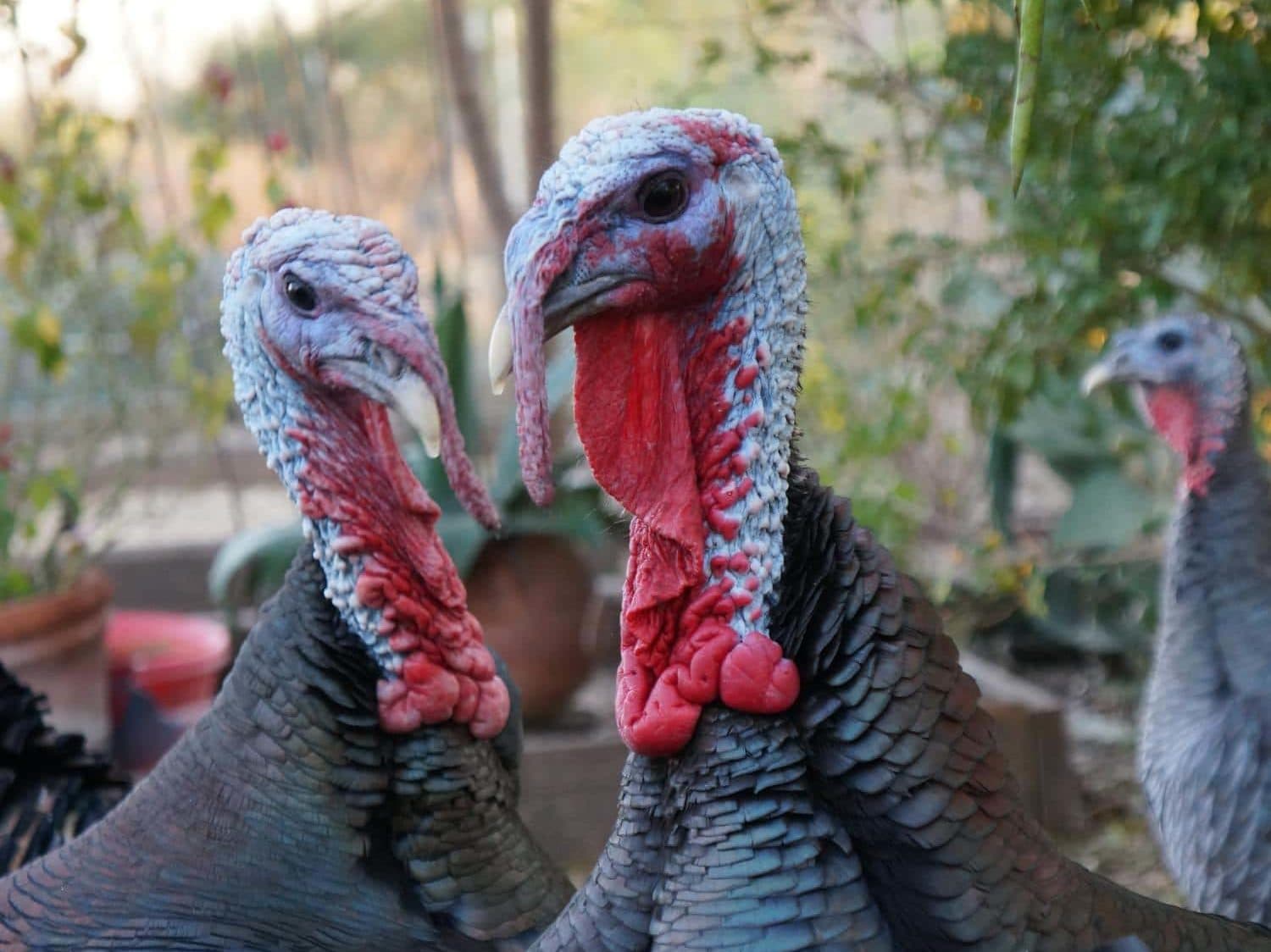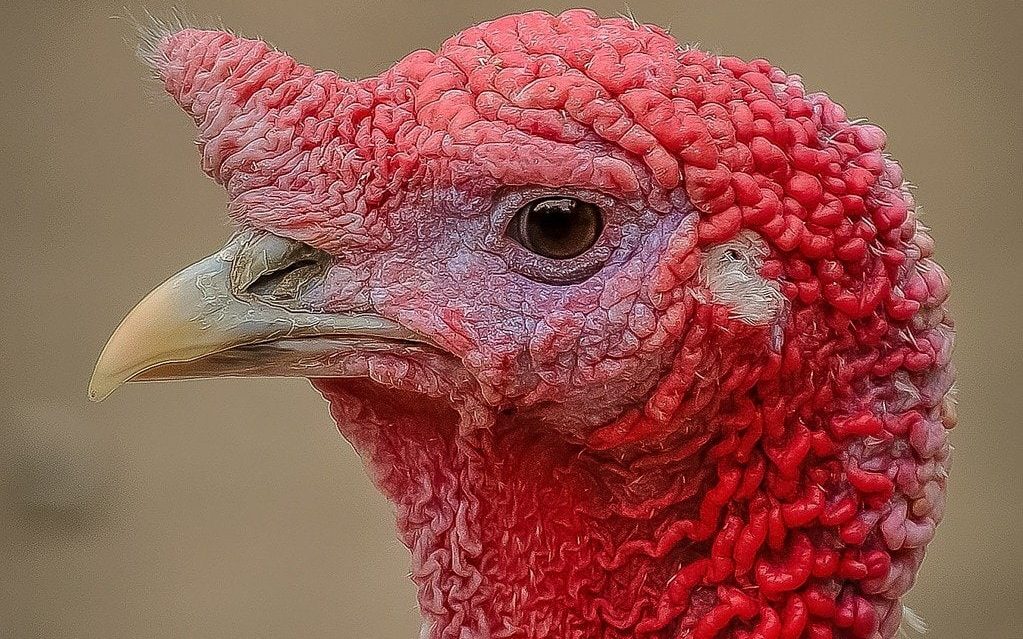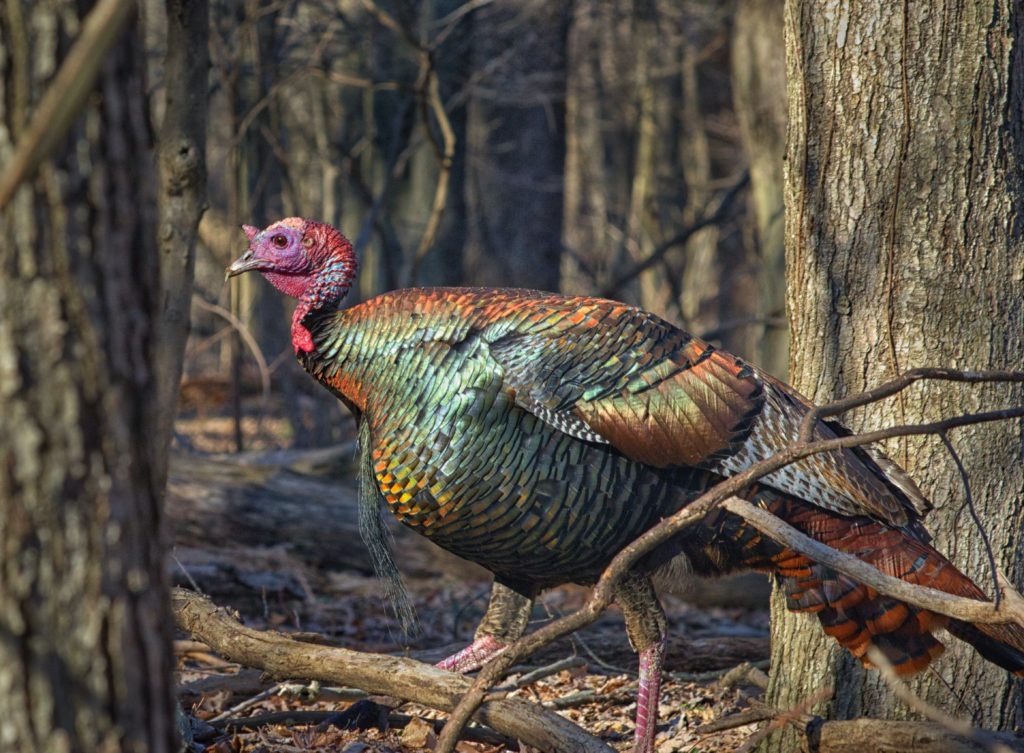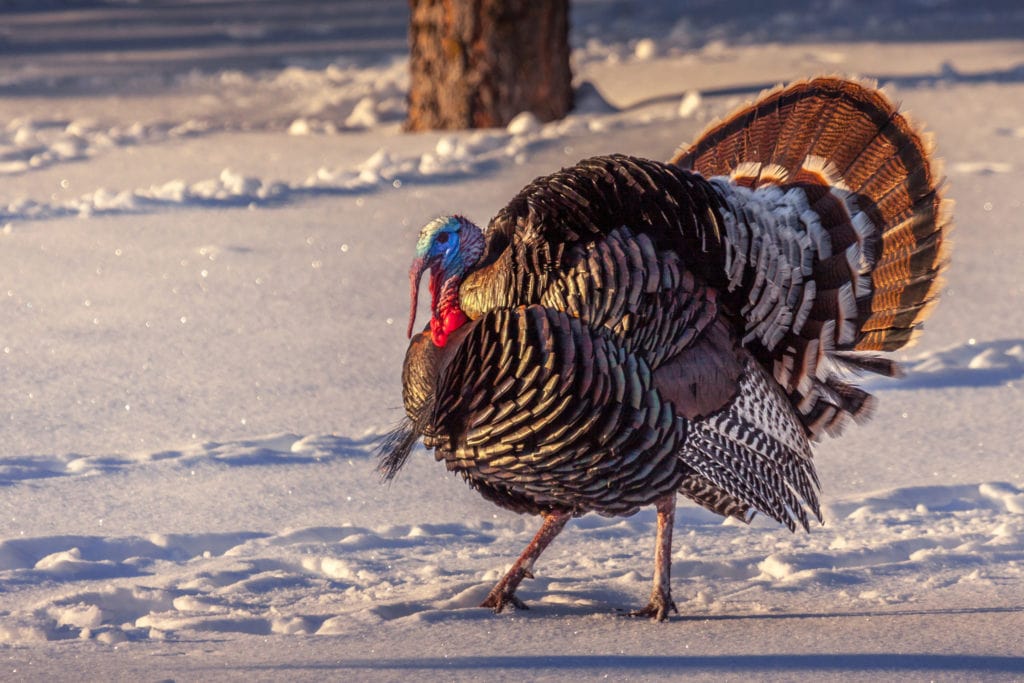The indisputable symbol of Thanksgiving is, of course, the turkey. A large ground-dwelling fowl Native to North America, the turkey has long been associated with prosperity; a plentiful harvest meal. Every year, millions of Americans sit down to enjoy a turkey dinner surrounded by loved ones and a festive holiday spirit.
There is much more to the turkey than its central role on the holiday dinner table, though. Indeed, the turkey is a bird rich in virtue and in tradition. In fact, Benjamin Franklin once praised the stalwart turkey for his many favorable qualities. (1) Myths abound regarding turkeys being proposed as a competitor to bald eagles for the title of America’s national bird. Though the turkey is not known to have ever been proposed for this role, Benjamin Franklin’s letter in praise of the turkey found this bird to be much nobler than the bald eagle. (2)
Besides the obvious connotations of festivity and prosperity, the turkey has many interesting and significant meanings. As a bird that is widespread and adaptable, many Americans interact with turkeys often and may wonder about the wisdom that could be gained from such encounters. In this article, we’ll explore the many meanings of the turkey, the historical symbols and myths associated with this beautiful bird, and the spiritual implications connected to turkeys. Perhaps, the next time you sit down to enjoy the taste of a delicious turkey, you will remember with gratitude the unique and fascinating animal who provided it.
Turkey Symbolism and Meaning
Turkeys are symbolic of prosperity and plenty, as mentioned above. Indulging in a turkey dinner to celebrate the success of the harvest is a tradition in American culture that dates back to the first Thanksgiving.
Because of its role in Thanksgiving, the turkey is also associated with generosity, gratitude, family, and friendship. Like the holidays themselves, the turkey brings people together to share in the spirit of love, cooperation, and thankfulness.
Family and cooperation are apt associations for turkeys. These birds generally live in large flocks comprised of generations of families with established hierarchies. They look after one another, roost together in the evenings, and rely on the safety found in numbers.
Turkeys are sexually dimorphic, meaning that males and females have different physical appearances. Male turkeys are much larger and possess the iconic fanned tail that most people picture when they envision turkeys. Males squabble over dominance until a hierarchy is established. The dominant male often plays a protective role in the flock. So, turkeys are often associated with masculinity, protection, and fatherhood.
Turkey is often used as an insult, albeit not a particularly sharp one. To call someone a turkey usually means that they are cowardly or foolish. This is, ironically, the opposite of the courageousness that Benjamin Franklin attributes to turkeys in his now famous letter comparing them with bald eagles. (4)
| Latest Articles: |
|---|
| Dodo Bird Symbolism & Meaning Birdwatching in Southern California Why Are Crows So Smart Birdwatching in France |
Turkey Native American Symbolism
Turkeys are very significant animals in Native American traditions. They have many different meanings that vary between people and legends. Their feathers are often coveted items of sacred significance.
In some cases, turkeys were believed to have the power to predict the future. In others, the turkey could only predict the weather. Associations between turkeys and weather phenomena are quite common. The Pima people believe that the turkey is a rain spirit. (5)
Turkey Christianity Symbolism
Although turkeys do not have a significant role in Christian symbolism via biblical scripture, American Christianity has happily incorporated the turkey as a symbol of the holidays and the gratitude in the heart of the Christian for the plentiful blessings bestowed by God.
The virtues of the turkey espoused by Benjamin Franklin resonate with the Christian virtues of protection, honesty, and integrity. Though it may be a myth that Franklin seriously suggested that turkeys should replace bald eagles as the national bird, in a letter to his daughter, he found favorable comparisons between turkeys and the bald eagle. Pointing out that the eagle on the badge of the Society of the Cincinnati Medal looked like a turkey, Franklin went on to say:
“For my own part, I wish the Bald Eagle had not been chosen the Representative of our Country. He is a Bird of bad moral Character. He does not get his Living honestly. You may have seen him perched on some dead Tree near the River, where, too lazy to fish for himself, he watches the Labour of the Fishing Hawk; and when that diligent Bird has at length taken a Fish, and is bearing it to his Nest for the Support of his Mate and young Ones, the Bald Eagle pursues him and takes it from him… I am on this account not displeased that the Figure is not known as a Bald Eagle, but looks more like a Turkey. For the Truth the Turkey is in Comparison a much more respectable Bird, and withal a true original Native of America… He is besides, though a little vain & silly, a Bird of Courage, and would not hesitate to attack a Grenadier of the British Guards who should presume to invade his Farm Yard with a red Coat on.” (6)

Though it’s certainly likely that Franklin was engaging in a bit of satire, the turkey is, in truth, a fine example of a brave bird that makes an “honest” living. Turkeys are fiercely protective and have been known to charge at creatures much larger than themselves. They wander miles and miles of territory each day in search of food to eat before roosting in a tree at night. In this way, turkeys are a down-to-earth sort of bird of which America can be proud.
Turkey in Dreams
When a turkey makes an appearance in your dreams, this can leave a lasting impression. If you’ve been wondering what your turkey dream means, there are many possible explanations.
Turkeys are not solitary animals. They are uncomfortable on their own and prefer to move about in large flocks in which they know their place in the hierarchy. If you have a dream about a single turkey, it may mean that you feel isolated or vulnerable. Perhaps you are lonely without a flock of your own, or perhaps you are grappling with insecurities regarding how you fit into the lives of your friends and loved ones. A turkey dream may act as a reminder that friendship and family ties are built upon cooperation. If you want to feel more secure in your relationships, examine the ways that you can be there for your loved ones.
Dreaming of a turkey in the context of food indicates a bounty to come. Such a turkey dream can mean that something unexpected and enriching may come into your life soon. Be sure to treat such things with acknowledgment and gratitude.
If you’ve had a dream about a female turkey, it may be that you feel overwhelmed by masculine energy. The female turkey is often overshadowed by the gregarious males. Though females are patient, there comes a time to peck back!
Turkey Encounters and Omens
An encounter with a turkey is usually a lucky occurrence. Turkeys are habitual wanderers that spend their days grazing on plant matter and insects over long stretches of their home ranges. (7) Encountering one turkey on its own is much less common, and most turkey encounters will involve a small group of stragglers or a whole flock passing by.
Encountering turkeys is often considered a sign of prosperity. For the land to sustain a flock of turkeys, there must be food and water plentiful enough to feed the flock.
A turkey encounter can be a source of guidance. If a turkey approaches you, it means that you have a gentle and trustworthy soul. Turkeys are honest and intelligent birds that are unlikely to be fooled by a person with dark intentions.
A turkey encounter may also indicate that your family will grow in the near future. Turkeys are dedicated parents who diligently raise their chicks, or “poults.” If a large flock of turkeys, or a mother turkey with poults, cross your path then it may mean that a new addition is on the horizon.
Turkey in Mythology & Folklore
Turkeys are native only to North and Central America. So, their mythological meanings are limited to the folkloric traditions of the people of these regions. It is almost impressive, considering this fact, how much turkey lore exists.
Native American Mythology:
Native American mythology has many myths that feature the turkey. In one story, a turkey is burned when he consumes a hot ember thinking it is a firefly. This story explains that this mistake is how the turkey got its signature red coloration on its head and neck. (8)

Some tribes considered the turkey to be a psychopomp, or spiritual guide to the dead. At times, they would wrap their dead in turkey feathers to symbolize this connection. (9)
Chalchihuihtotolin is an Aztec god whose name means “jade turkey.” Chalchihuihtotolin is a god of plague and sorcery who is also associated with feasting and revelry. (10)
In Hopi culture, the Koyona Kachina is the turkey spirit. It is one of many spirits or “Kachinas” representing the power of nature. Hopi dances involving the Kachinas included elaborate costumes and feather adornments. (11)
There are many many more turkey myths and stories in Native American mythology; far too many to cover with such a brief summary. I encourage you to look into these myths and enjoy the rich folkloric traditions of the Native Peoples of the Americas.
Turkey Spirit Animal
The turkey spirit animal is most often present in individuals who are extroverted and gregarious. Social butterflies with a strong sense of both family and duty, the turkey spirit animal is the consummate “people person.”
One of the most positive traits of the turkey spirit animal is its work ethic. People with the turkey spirit animal are happy to rise early and work hard to provide for their loved ones.
People with the turkey spirit animal may struggle with being too headstrong or stubborn. Like turkeys who regularly bicker over dominance, people with the turkey spirit animal may feel uncomfortable relinquishing control to others.
Turkey Totem Animal
The turkey totem animal is deeply connected to the land. Most people with this totem animal feel a sentimental connection to their home and ancestry. Like the family-oriented turkey spirit animal, a person with the turkey totem animal is hardworking and honest.
Additionally, the turkey totem animal is commonly found in those who are prone to wandering. People with the turkey totem animal are adventurous spirits, like turkeys who are naturally inclined to trek all day long, they may begin to feel restless or uneasy when made to live a sedentary lifestyle.

People with the turkey totem animal are often very attentive and nurturing. They may have a tendency towards “tough love,” but beneath the surface, they would like nothing more than to fuss over their loved ones all day.
Turkey Power Animal
The turkey power animal is associated with luck and reciprocity. Because turkeys are so connected to bounty and prosperity, the turkey power animal grants these blessings. Be warned, however, because the turkey power animal is devoted to balance.
When luck favors an individual with the turkey power animal, it is essential that they accept their blessings with humility and gratitude.
The turkey power animal is often found in those with incredible perseverance. One of the powers of the turkey is the stubborn drive to never give in.
Turkey Tattoo Meaning
A turkey tattoo may represent love for the holidays. Similarly, it is likely that such a tattoo would have significant ties to themes such as gratitude and generosity. Such a tattoo may act as a tangible reminder to count one’s blessings.
Conclusion
Turkeys put up with a lot from us humans. We happily dine on them, and celebrate the opportunity to do so, while simultaneously using their name in place of insults like “coward.” I propose that the festive turkey is a criminally underestimated animal.
Sacred to many Native American cultures, the turkey is so much more than a succulent meal. In fact, if one of our treasured founding fathers is to be believed, the turkey is a courageous animal and a worthy symbol for the steadfast American spirit.
However, even more than this, I think turkeys symbolize family above all else. Birds of a feather that flock together, turkeys are truly social animals who thrive in one another’s company. This spirit of togetherness is reflected in the spirit of Thanksgiving and the holidays at large. The turkey is a bird that brings us together and for that, we should all give thanks.
| More Spirit Animal Symbolism to Read About: |
|---|
| Cuckoo Symbolism & Meaning Chicken Symbolism & Meaning Stork Symbolism & Meaning Cowbird Symbolism & Meaning |


I had an encounter with a turkey today, it flew or glided across the road in front of my car it was so close that I could see the details in its feathers ! It was a beautiful site 🤗 Thank you for sharing, I enjoyed it !
You mentioned reading up on folkloric traditions of the Native Peoples of the Americas. I have searched and searched and searched for books relating to this subject and am not satisfied with what I have found. Do you have any book recommendation’s related to folkloric traditions of the Native Peoples of the Americas? Thank you.
One source I really enjoy is the small nonprofit website “native-languages.org” which includes linguistic information, myths, oral histories, and extensive book recommendations for various subjects. Thank you for reading my article and I hope you find what you’re looking for!!!
— Hailey Brophy
Writer @ World Birds